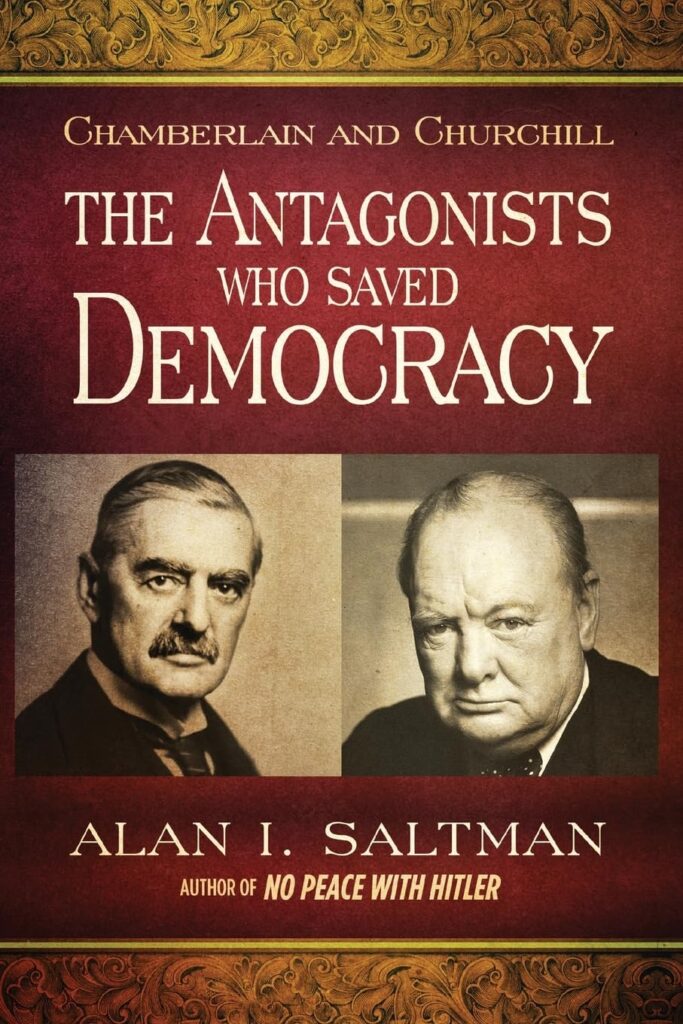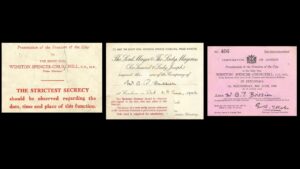
Bulletin #206 — Jul 2025
“Poor Neville”

To view in full, right click and choose "Open in new Tab"
June 27, 2025
Alan I. Saltman, Churchill and Chamberlain: The Antagonists Who Saved Democracy, W. G. Hobart, 2025, 508 pages, $25.99 / £19.86. ISBN 979–8985479430
Review by JOE OLIVER
When Neville Chamberlain is remembered at all it is usually in counterpoint to Winston Churchill; Chamberlain as the man fooled by Hitler, and Churchill the far-sighted visionary who cleaned up the mess. Alan I Saltman, whose No Peace with Hitler was reviewed in Finest Hour 200, approaches the two men from an unexpected angle in his new book Churchill and Chamberlain: The Antagonists Who Saved Democracy.
“Antagonists” is an appropriate word. Churchillian studies having generally considered the two men in contrast to each other. Many contemporaries saw them differently, as Saltman illustrates with a striking quotation from the pro-Appeasement Conservative MP Patrick Donner “Neville Chamberlain and Winston Churchill between them saved this country….Neither statesman would have achieved our salvation without the other.”
The image of Churchill saving Britain remains familiar, but the idea of Chamberlain as national saviour, whilst shared by some in the aftermath of the 1938 Munich Agreement, has been unfashionable, if not risible, since. Likewise, whilst there have been several studies of Churchill’s relations with his political colleagues (Leo McKinstry’s Attlee and Churchill and David Charlwood’s Churchill and Eden being two recent contributions), Churchill and Chamberlain are rarely considered as a partnership. Indeed, Aidan Phillips’ study of Chamberlain better reflected the consensus with his unflattering title Fighting Churchill, Appeasing Hitler.

2025 International Churchill Conference
The first half of Saltman’s book serves as a detailed dual biography comparing Churchill and Chamberlain’s backgrounds. Parallels between them are not difficult to find. Both endured miserable schooldays, Churchill at Harrow and Chamberlain at Rugby, and both underperformed academically despite later becoming prodigiously literate.
Both men also grew up in the shadows of famous fathers against whose reputation they longed to prove themselves. Chamberlain, who also had to contend with his celebrated elder brother Austen, wrote in his diary in 1921 how it was a “great handicap to be the son of my father and the brother of my brother, for every success is discounted and every failure is counted double.” It is also notable that before becoming Prime Minister, both men were pioneering social reformers and long-serving Chancellors of the Exchequer, an office which had previously been held by Churchill’s father and Chamberlain’s brother.
But the differences were also stark. Churchill’s lineage was aristocratic, while Chamberlain’s background was staunchly middle-class. Churchill began his career in national politics, with eyes on Number 10, at age 25. Chamberlain served a long apprenticeship in local government and did not become an MP until he was nearly 50 in 1918. Churchill reportedly disparaged by him as “a Birmingham town councillor who looks at our national affairs through the wrong end of a municipal drainpipe!” Chamberlain for his part dismissed Churchill, then a Liberal MP, as far back as 1907 as “a bumptious youth” saying publicly that “The sooner Mr Churchill was sent as an ambassador to Timbuctoo the better.” Saltman also describes Chamberlain as having a “revulsion of war” who (according to another illuminating quotation from his colleague David Margesson) found “all military matters extremely distasteful”—an attitude certainly not shared by Churchill.
In temperament the two were “diametric opposites” when dealing with disagreement. While Churchill was open to criticism, Chamberlain deliberately ignored opposing views, with one colleague reporting his mind “once made up, was ringed round by a barrier so hard and so unimaginative that no argument could penetrate it.” When accused of treating Labour MPs like dirt, Chamberlain responded that “intellectually they are dirt.” Churchill’s contrasting ease in working across party lines would be crucial when events compelled the formation of a National Government in May 1940.
Saltman relates how for most of their careers the two men enjoyed collegiate if not close relations, culminating with Churchill seconding the nomination of Chamberlain as Conservative Party Leader in 1937. Presumably, this was primarily an honorary speaking slot given due to Churchill’s seniority, but it remains a surprising prequel to the “lowest ebb” their relationship reached a year later with the Munich Agreement.
Saltman argues that it was after Foreign Secretary Lord Halifax’s “sycophantic” meetings with Hitler and Goering in Autumn 1937 that Churchill’s views really diverged from those of the Chamberlain Government. He quotes Halifax’s startlingly naive reports back to the Cabinet assuring them that Germany had “no outside interests” and there would be no war.
Chamberlain in turn wrote breezily in his diary in 1937 that “of course they [Germany] want to dominate Eastern Europe” and that “I don’t see why we shouldn’t say to Germany ‘Give us satisfactory assurances that you won’t use force to deal with the Austrians and Czechoslovakians and we will give you similar assurances that we won’t use force to prevent the changes that you want.’” Chamberlain’s notorious reference to German designs on Czechoslovakia as “a quarrel in a faraway country between people of whom we know nothing” seems even grimmer in this context. The Prime Minister persistently believed, despite mounting evidence, that he could trust Hitler to keep to agreements until the events of 1939 left him feeling personally betrayed and belatedly aware of the need to stand firm against the dictator.
The core of Saltman’s partnership argument centres on the antagonists’ good working relationship from 1939 to 1940 when, after years of adversity over appeasement, they enjoyed an “amazing reproachment” and served in each other’s Cabinets. When he became First Lord of the Admiralty in Chamberlain’s war ministry in September 1939, Churchill recalled his “singular experience of passing in a day from being one of his most prominent opponents and critics to being one of his principal lieutenants.”
When Churchill replaced him as Prime Minister in May 1940, Chamberlain, still Conservative Party Leader, retained great influence, and Saltman emphasises how Churchill depended on his predecessor’s support. Churchill had to include him in the five-man war Cabinet. On his first day as Prime Minister, Churchill wrote Chamberlain, “I am proud to have won your friendship and your confidence in an increasing measure. To a very large extent I am in your hands.”
Chamberlain’s attitude to whether Britain should seek a negotiated peace in May 1940 is examined in depth, as are later interpretations of his motives, with Saltman concluding that Chamberlain’s support for Churchill’s determination to fight on was firmer and less “wobbly” than many historians have appreciated. Despite moments of “disturbing’ pessimism” confided to his diary, Chamberlain supported Churchill in crucial War Cabinet debates, with the minutes making clear that he shared the view that Britain should fight on alone if necessary.
In fact, from September 1939 Chamberlain had resolved that Britain must “fight to the finish” until Hitler was removed from power. Saltman argues that only the “extraordinary persistence” of Lord Halifax caused any debate around negotiations, with Churchill and Chamberlain both opposed. Chamberlain worked skillfully as a conciliator between Halifax and Churchill, keeping the fledgling Government together.
After Chamberlain’s death from cancer on 9 November 1940, Churchill commented “Poor Neville. I was relying on him to run the Home Front.” Chamberlain’s rapid decline robbed him of any opportunity to defend himself before history, as Churchill would do comprehensively in his narrative-setting War Memoirs.
Whilst arguing the importance of Chamberlain’s support for Churchill in 1940, this is not a broader revisionist defence. Saltman writes that Chamberlain was “guilty of most everything that’s been commonly attributed to him” acting in “ways that were beneath a Prime Minister of Great Britain,” including wiretapping domestic opponents and “selling out” Czechoslovakia internationally.
Saltman has not attempted a narrative history as a ripping yarn, and a casual reader might find the sheer quantity of information presented to be a slog. A few minor inaccuracies with names and dates have also crept in, and since the book supplements Saltman’s earlier No Peace with Hitler, it understandably retreads much of the same ground. Nevertheless, as a reference book this would be a useful addition to school or university libraries. Students working on essays will find a wealth of information and the arguments of different historians’ accessibly summarised and will likely appreciate Saltman’s rather appealing habit of posing rhetorical questions and then immediately answering them.
For his sources, Saltman has relied on a thorough compilation of secondary literature rather than new revelatory discoveries, but he does quote extensively and to good effect from Chamberlain’s diary and candid letters to his sisters.
Confined to a footnote, Saltman gives a telling archival anecdote about the respective reputations of his subject. Whilst Chamberlain’s papers are at the University of Birmingham’s Cadbury Research Library, “today there is no indication anywhere on campus that he ever had any association with the school as a student, major fundraiser…[or] a supporter who had helped the school acquire its present site.” Compared with the development of the Churchill Archives Centre at Churchill College, Cambridge, Chamberlain’s name has not been one to conjure publicity or fundraising.
Whilst his disastrous dealings with Hitler mean there is unlikely to be an International Neville Chamberlain Society any time soon, Saltman’s account of his staunch support of Churchill during Britain’s “finest hour,” provides him with a redemptive coda that deserves its place in the historical record.
Joe Oliver is an alumnus of the University of Sheffield and University of Exeter history departments and author of “How UFOs KBO: Close Encounters of the Archival Kind.”
Subscribe
WANT MORE?
Get the Churchill Bulletin delivered to your inbox once a month.





